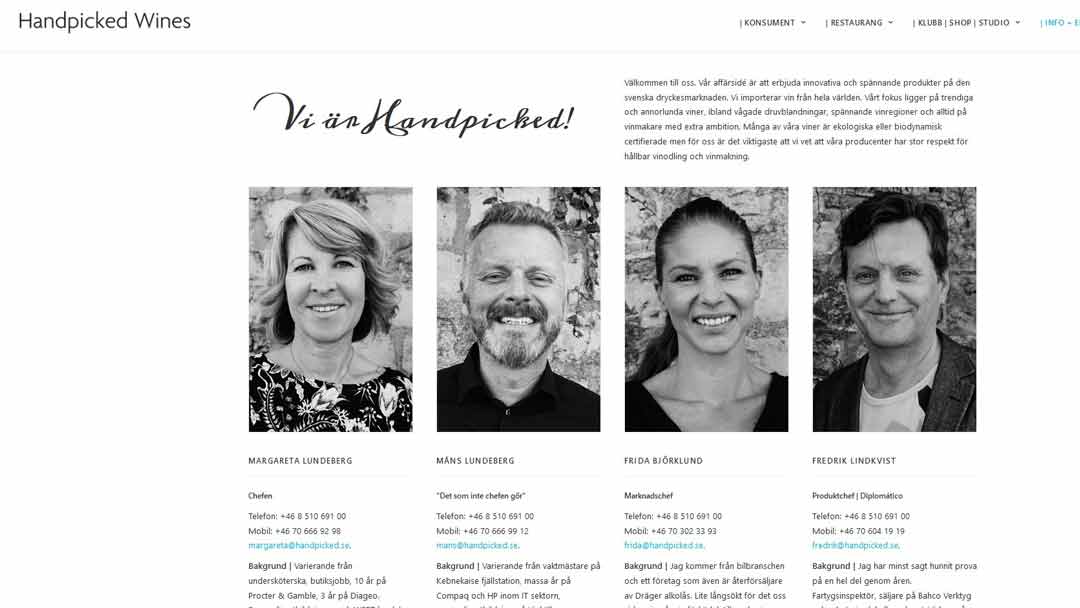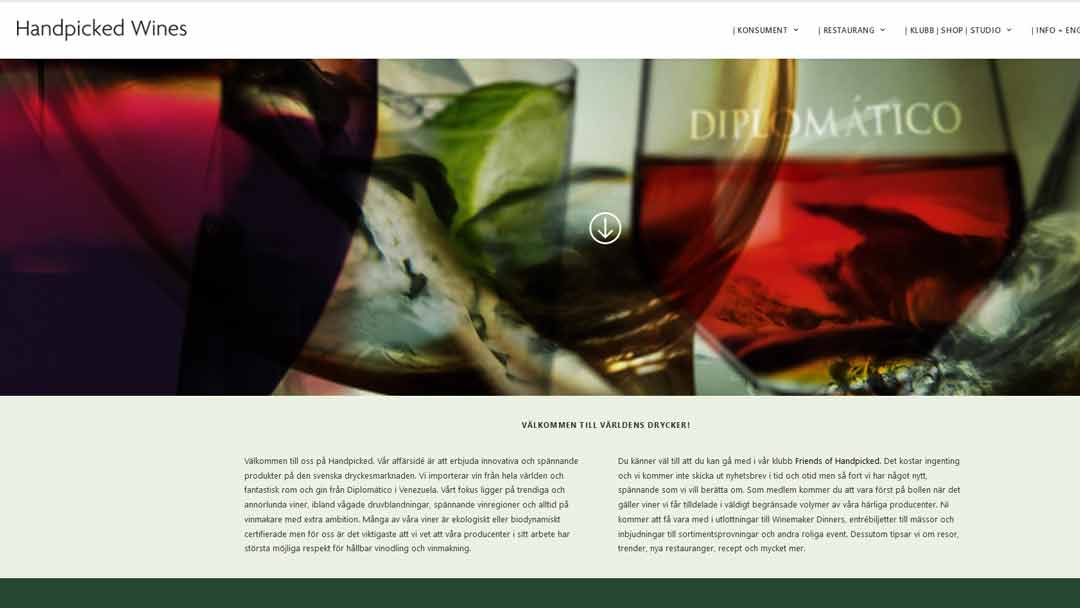What does a wine importer and small business owner do when suddenly large parts of the business base disappear? Calling for help and waiting for support or trying to find solutions to adapt the company to a new situation? This is precisely what happened when the pandemic struck and restaurants and other service companies closed down, and also the supply of goods took longer or ceased due to chaos in the transport industry. BKWine Magazine’s Carl-Erik Kanne met Margareta Lundeberg, one of the founders of Handpicked Wines, a Swedish wine importer, and talked about how they have weathered the storm.
Much has been written about what has happened to the hotel and restaurant industry. Those who seem to have done best are those who have been creative and flexible and thereby managed to avoid a total shut-down and bankruptcy. Still, I thought it might be interesting to see what it looked like for a wine importer and an independent business owner without backup from higher powers in the food chain.
In connection with a trade tasting at Handpicked Wines in Stockholm, I had a chat with Margareta Lundeberg, founder and co-owner, together with her husband Måns, who also sits on the board along with a brother-in-law. A quite typical family business in the industry with about 20 employees and a turnover of SEK 55-60 million (~5.5-6 million euro).
What happened at Handpicked Wines was that all restaurant customers virtually ceased or sharply reduced their purchases and also that the rum Diplomatico, which was sold on the Finnish ferries, no longer had that channel available. (The tax-free trade on the ferries across the North Sea between Sweden and Finland can represent very big volumes.) Half a dozen salespeople had nothing to do and were laid off.
The management team had to think hard about how to adapt what remained of the business to the new reality.
Here are some critical features of Handpicked’s corporate philosophy, points that strongly contributed to that, after all, they not only saw darkness ahead but that there could be many good outcomes:
- The wines they sell are usually of the slightly more unusual kind from smaller and quality-oriented producers
- The team spirit was strong among the employees, who are mostly young and with a good education in wine
- They depended not only on the sales to restaurants, but sales to and via Systembolaget were healthy and growing.
- (Editor’s comment: Many small importers focus on the restaurant trade only. Restaurants can buy directly from importers and thus are not subject to the Systembolaget monopoly channel. However, regular consumers must purchase wine through the monopoly in the Systembolaget shops. The monopoly is only for retail sales.)
- The company’s customer wine club was, and still is, an important channel to inform an increasing number of wine enthusiasts who are interested in wines outside the volume wines.
- (Editor’s comment: Many importers run “wine clubs”, which are essentially based on email newsletters, websites, and events, enticing members to buy the wines in the monopoly stores. The wine clubs cannot sell wine directly.)
To better understand Handpicked’s actions, I asked Margareta to give a more concrete picture of how the company philosophy works in practice.
To start with the business idea; Margareta explains:
“Our business concept is to offer innovative and exciting products in the Swedish beverage market. We import wine from all over the world. Our focus is on trendy and somewhat unusual wines, sometimes daring grape blends, exciting wine regions and always on winemakers with that little extra ambition. Many of our wines are organic or biodynamically certified. Still, for us, the most important thing is that we know that our producers have great respect for sustainable viticulture and winemaking.”
It all started with Margareta wanting to take more advantage of her sommelier education as she, after a few years of employment with one of the biggest importers, felt that it would be more fun to work with small producers who focused on craftsmanship and quality and wines less mainstream.
So, in 2005 she started the predecessor to Handpicked but soon discovered that producers were not very keen on waiting a long, long time to get a quote approved in the big tenders at Systembolaget. Therefore, they needed to sell to both Systembolaget and to restaurants to get the business going. In addition, given the type of producer they had chosen to work with, the volumes from the producers were often too small to fit in Systembolaget’s procurement templates with pre-defined taste profiles.
The suppliers (producers) are essentially “handpicked” through personal visits and the creation of a relationship based on trust. Once they have established good contact with someone, the collaboration has worked well. The turnover of producers is therefore low. Nor have there been any “producer poachings”, which is otherwise relatively common in this industry. There are about 1000 organizations in Sweden today that are registered to import wine.
The only noticeable setback was five wine brands that made Washington producer Charles Smith famous (Kung Fu and Bom Bom, to mention two of them). Charles Smith sold those to Constellation Brands in 2016 and thus Handpicked lost them. The wines continue to be produced as before with Charles Smith as a consultant. The production volume was around 500,000 cases per year in the price range of 12 to 15 dollars per bottle, which is to be compared with the brands that Charles Smith kept with about 350,000 cases per year.
For Handpicked, this meant that they lost a sales volume of around 100,000 bottles yearly to Systembolaget. Bibendum, part of the conglomerate Altia (owned by the Finnish state), took over these brands.
This corporate philosophy has permeated the business right from the start. They try and avoid as far as possible large scale, such as “industrial wines”, bag-in-box wines, and make no effort to grow at any cost.
It should be “fun” at work, and that includes developing at the pace you feel is natural.
Already from the outset, Margareta wanted to keep the business small in order to better establish and maintain a team spirit. Both she and her husband Måns came from a background in large companies and wanted to avoid unnecessary bureaucracy and rigidity as much as possible. They have managed to maintain flexibility and adaptability, which has been very useful when the pandemic struck.
Hiring is made with gut feeling. For salespeople, good wine education is fundamental in order to be able to have a good dialogue with customers, restaurants, about the place of wine in their business. Furthermore, as an employee, you should preferably share the company’s fundamental values and be a team worker rather than an individualist. As a team member, you have tremendous freedom to creatively participate in the design of programs and plans. “Freedom with responsibility.” They have also broadened their recruitment base to younger people and have, among other things, a person who was recruited through an aid organization for university-educated refugees. That person has now been given permanent employment. In cases where staff has been brought in through contacts, they receive wine education via Handpicked.
What then is the “glue” in the company? How do you motivate and retain your employees?
That everyone shares the values and the family feeling is an essential ingredient. Some motivation is available through bonuses or commissions. Staff turnover is very low. The employees obviously like working there.
One element of staff motivation has been the training of employees. One part of this is that employees visit the producers, and the latest thing is to have digital meetings between employees and producers, which they now have every Monday.
Thanks to the founders’ background in large companies, there is knowledge and experience that is very useful for achieving profitability in the company. You can not only have fun but must also be effective. Wasting time, unnecessary meetings and other such things are minimized.
When restaurant sales plummeted, sales via Systembolaget became all the more important. One consequence of choosing to work with smaller producers is that Handpicked has few wines in the so-called fixed range. (Editors comment: The “fixed range” contains products that are must be available for a longer time on the shelves of Systembolaget and that can be re-ordered identically from the supplier if needed. This contrasts with the “temporary range”, with smaller lots that are not restocked once finished. A totally different set of products is the “on-order range” with products that are managed exclusively by the importers, and the monopoly is only a delivery point.)
Instead, they have previously focused on the “on-order range” with parts of its restaurant range. (Editor’s note: this is the importers’ own selected assortment, where Systembolaget is only a delivery point without another role. An importer can request any product they wish to be put on the “on-order” list. The Systembolaget will put it on the list but take no responsibility for it and does not provide any information. Yes, it is curious. The “restaurant range” contains products that importers sell directly to restaurants, bypassing the monopoly. It usually has a much more extensive selection of wines than what is sold through Systembolaget.)
During the pandemic, there has been an increased focus on the so-called “temporary” launches at Systembolaget (see explanation above). This segment is changing and is an increasing part of Systembolaget’s offering. At the temporary launches, you can sometimes reach volumes of 5000-6000 bottles and retail prices of SEK 150-200 per bottle, which suits many of Handpicked’s producers well.
Marketing is done mainly through social media and the customer wine club, as well as through personal sales to restaurants. In only a few cases, have they had advertising sponsorship from producers. They’re mostly too small for that. The targeted sales via the customer club work well and the various mixed cases they sell that way create ripple effects.
With the pandemic, the company’s website and its links to the customer club became an important channel to reach out to, and various social media (Facebook and Instagram) were also activated.
The customer club started digital meetings with consumers and producers over Zoom, which also included wine tastings. This kind of event has become popular with many wine importers. Handpicked also started a small wine school with beginner’s education to increase curiosity about wines and thus attract more visitors to the on-order range (available via Systembolaget).
The customer club business also provides good feedback on what kind of relationship consumers have with wine.
Positive trends are that young wine consumers are becoming increasingly knowledgeable and demanding in terms of sustainability and also about grape growing and winemaking. This means that the consumers are no longer as price-sensitive, so two euro more or less is not so important when the wine cost between 15 and 25 euro. Therefore, price changes due to currency fluctuations do not hit sales much. It also means that the customer is willing to pay more for a wine that is of high quality, and there will thus also be more left over to the winemaker. A bottle that today costs 6 euro (i.e. more or less the cheapest on the Swedish market) or a three-litre BiB of wine for 15 euro (idem) is not something that leaves much for the winemaker.
In conclusion, Margareta emphasized that the direction they have chosen also seems to work in a changing world. The small scale and adaptability are the most critical factors for this. Handpicked has had a stable development and has now reached a fairly optimal size both for sales and staff. Future changes both upwards and downwards are felt to be manageable.
Here you can find more information on Handpicked Wines.












